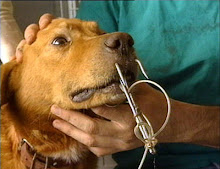New Parasite Infection Killing Pet Dogs in Southern England
Vetscriptions CEO Andrew Prentis advises all UK dog owners to protect their dogs against rising levels of infection with a potentially fatal lungworm.
London, UK (PRWEB) February 25, 2009 -- It was not that long ago that lungworm in dogs was considered to be an exotic disease, and not at all the sort of thing that we needed to worry about in the UK
Not so in 2009.
The lungworm's slightly improbable scientific name is Angiostrongylus vasorum. It used to be known as the 'French heartworm' giving lie to it's continental origins, but recent studies have shown it now to be alive and well in the UK, with infections in dogs now occurring regularly in the Southern Counties and much more recently in the Midlands.
The main reservoir of infection seems to be the common red fox. An article in the journal Veterinary Practice back in 2005 suggested that it was the increasing urbanisation of the fox that might be the crucial factor in its spread.
A more recent paper published by Morgan and colleagues in Veterinary Parasitology in 2008, confirmed that nearly 10% of wild foxes in the UK are now infected. This varies from almost none in Scotland to as many as 23% of foxes being infected in Southern England.
Garden snails and slugs are the creatures that actually spread the parasite from the resident fox population and it is here that so many of our pet dogs start to be at risk.
"How many people wake up to find snail trails in the garden or on the patio?" asks vet Andrew Prentis, Managing Director of Vetscriptions Ltd "It is from eating snails or slugs or by licking at these trails that pet dogs can become infected."
Infection with this parasite is potentially fatal and can be difficult to spot in the early stages. Later and more serious signs of infection include coughing and difficulty breathing. Lungworm can cause a rapid heart rate, limb swelling and neurological symptoms including weakness and loss of co-ordination, but it is the cases of sudden and uncontrollable internal bleeding that are causing the most distress.
"Luckily there are a number of medicines available that can provide real and lasting protection from this nasty parasite. At www.vetscriptions.co.uk we recommend that all dog owners make it their business to find out about this disease and make sure that their dogs are fully protected."
Wednesday, February 25, 2009
Subscribe to:
Post Comments (Atom)

















No comments:
Post a Comment